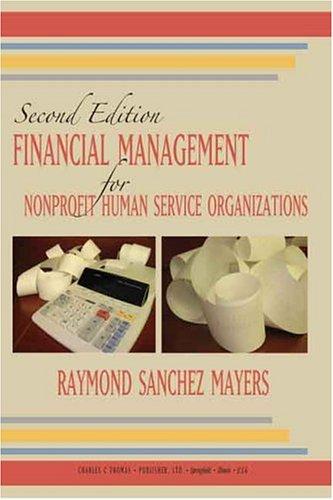Question
Remember, an agency relationship can degenerate into an agency conflict when an agent acts in a manner that is not in the best interest of
Remember, an agency relationship can degenerate into an agency conflict when an agent acts in a manner that is not in the best interest of his or her principal. In large corporations, these conflicts most frequently involve the enrichment of the firms executives or managers (in the form of money and perquisites or power and prestige) at the expense of the companys shareholders. This usurping and reallocation of shareholder wealth is most likely to occur when shareholders do not have sufficient information about the decisions and actions being made by the firms management.
Consider the following scenario and determine whether an agency conflict exists:
Last week, an investigative reporter for a major metropolitan newspaper discovered that the doctors conducting clinical trials of a new cancer treatment drug are also the principal shareholders in Cancer Solutions Inc. (CSI). CSI is the company developing and attempting to market the drug. Upon being interviewed by federal authorities, the doctors acknowledged their conflict of interest but reported that they were sold the shares at a 75% discount by CSIs chief financial officer. The CFO was concerned that CSI might not be able to meet its annual performance objectives and in turn pay his anticipated multimillion-dollar bonus.
1. Does an agency conflict exist between CSIs CFO and the companys shareholders?
a. Yes; the shares should not have been sold at a 75% discount, which is price discrimination.
b. No; professionals, such as doctors and professional money managers, would not participate in unethical activities.
c. Yes; CSIs CFO engaged in unethical conduct to manipulate the firms short-term earnings and improve the likelihood of receiving his annual bonus.
d. No; in general, shareholders are satisfied with company officers engaging in any type of legal or illegal activity to ensure the chances of them receiving greater dividend payments.
For the past 40 years, companies have attempted to attract, retain, and encourage managers by developing attractive compensation packages. These compensation packages have also been intended to reduce potential agency conflicts between these managers and the firms shareholders.
2. In the best interest of shareholders, compensation packages should be structured in a way such that managers have an incentive to maximize the (short-term/long-term) value of the companys common stock price.
3. Great Fortunes Baking Companys stockholders are mostly individual investors, and there is relatively little institutional ownership. If several pension and mutual funds were to take large positions in Great Fortunes Baking Companys stock, direct shareholder intervention would be (more/less) likely to motivate the firms management.
Step by Step Solution
There are 3 Steps involved in it
Step: 1

Get Instant Access to Expert-Tailored Solutions
See step-by-step solutions with expert insights and AI powered tools for academic success
Step: 2

Step: 3

Ace Your Homework with AI
Get the answers you need in no time with our AI-driven, step-by-step assistance
Get Started


